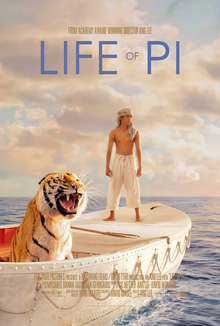Saturday, November 24, 2012
Life of Pi: Easy to like, a little harder to love, but the visuals are tremendous
I've been seeing a lot of articles, write-ups about Ang Lee lately and how versatile the filmmaker is and it made me think about how much I undervalue him as a filmmaker. He really is one of the best, he's not always consistent, but he always seems to bounce back in big ways and get back in the limelight with something pretty great. Visually, Life of Pi can be counted as part of that trend. It's absolutely beautiful in so many ways and it's hard not to have respect for Ang Lee and the film crew involved in what is, at times, a truly breath-taking experience. It's a film made for the visual medium in a lot of ways, but as enchanting as it may be, it loses its fire with the cutting back and forth between the story Pi tells and the conversation between him and the reporter who wants to write a book about his experiences.
From when it was announced, it had sounded like this would be quite a challenge to get Life of Pi off the ground but 20th Century Fox took a chance, an expensive chance. The results on screen are gorgeous visuals that are actually enhanced with the 3D. The best thing I can say is that I legitimately forgot I was wearing the glasses soon after the movie started. Ang Lee used it well. When they're out to sea and we learn of Pi's struggle to survive out in the middle of the ocean, it's really powerful stuff. It even raises some interesting questions, with religious overtones that never felt too intrusive.
Pi Patel now in his 50s lives in Canada with his wife and children, a reporter comes to visit him after hearing that Pi has a story that could make him believe in God. Pi talks about growing up in India, being named after a swimming pool in France (Piscine Molitor), which unfortunately sounds too much like "pissing." He eventually starts calling himself Pi once he gets to high school, memorizing all the numbers to Pi in order to get people to stop making fun of him for his unfortunate sounding name.
When Pi is well into his teens, his father announces that they're going to be moving to Canada and will be selling the zoo that he owns. They'll be taking a ship to North America, with a plan to sell the animals along the way. Whilst on board the ship, something goes horribly awry in the midst of a terrible storm in the middle of the sea leaving Pi all alone on a lifeboat with a zebra, a hyena, an orangutan, and an adult Bengali tiger. Pi then goes into great detail about how he manages to survive despite this unpleasant situation.
I understand the need for this film to be told in a "storytelling" fashion, someone in the present day telling a person this story, it's necessary because Pi's subjectivity as a narrator comes into play in a very big way towards the end. I get that and at the end it kinda pays off when we're forced into trying to decide what really happened on the lifeboat and wonder what Pi really had to go through in order to survive.
But the film would have been a masterpiece if we stuck to the visuals. If they managed to somehow get that aspect across whilst focusing primarily on the extraordinary journey, it would have been even more emotionally riveting, satisfying, and could still be thought-provoking. As it is, we have great moments mixed in with momentum-killing breaks in the story. This is a film that could've really been a wild adventure, it was already out there enough as it is, but the framing of this story has been used a bit too much in the past 50 years or so and they didn't really inject anything fresh into that part of it.
You may think it's a minor criticism but it's really not. Because the film has this storytelling aspect of it, it hides almost as much as it shows and in the end, you ultimately feel like there's something so much more to the story that you're missing. Its absence ultimately makes the film a bit too easy to swallow given the intensity of the lead character's struggle. It delves into some interesting ideas and metaphors, but it would've much better if it tried to explore these metaphors visually instead of cutting back into present day, and forcing us to contemplate the "real story" ourselves. It makes us wonder if the story was really worth getting into in the first place.
There's nothing inherently wrong about the twist of the film, but given how strong this film is visually, it feels like a cop out to reveal the twist verbally and not visually. Ang Lee and his crew did so many great things with this film from the amazing CGI, to how beautiful the sea visuals look, to the sequence of the ship sinking. That was all nice, but when it came to tying all of this to the heart of the story, that's where the film faltered. Because of this, the emotional climax hardly exists, leaving the audience to almost feel kinda empty.
Still, one simply cannot ignore just how gorgeous this film really is, Life of Pi is truly a sight to see and I can assure you that it's worth seeing it in 3D. It pulls you in almost as soon as you start watching it and it's easy to get hooked, but despite some of the best visual moviemaking of the year, I can't help but think just how much more satisfying and brilliant it could have been.
Grade: C+
Subscribe to:
Post Comments (Atom)

No comments:
Post a Comment